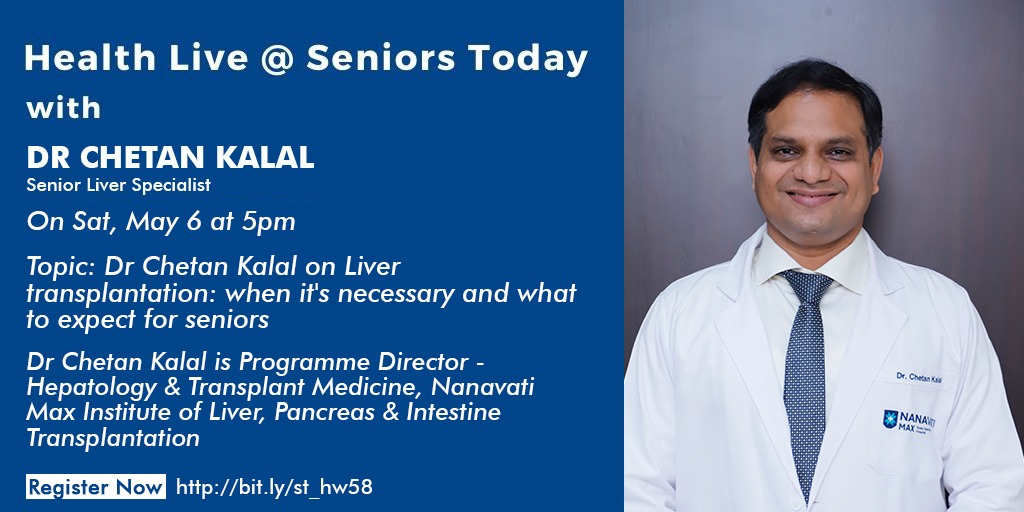On 6 May 2023, Seniors Today hosted their weekly Health Live Webinar with a Senior Hepatologist, Dr Chetan Kalal who spoke on and answered questions about Liver transplant: when it’s necessary and what to expect.
About Dr Chetan Kalal
Dr Chetan Kalal is Programme Director – Hepatology & Transplant Medicine, Nanavati Max Institute of Liver, Pancreas & Intestine Transplantation. Widely regarded as one of the best liver specialists in the country, he has been recipient of several awards including the coveted AASLD Foundation Award 2016 and 2017.
Qualifications:
MBBS (ACPM Medical College), MD, Medicine (Seth G S Medical College and KEM Hospital) and DM, Hepatology and Transplant Medicine (Institute of Liver and Biliary Sciences, New Delhi)
Experience:
Programme Director – Hepatology & Transplant Medicine, Nanavati Max Institute of Liver, Pancreas & Intestine Transplantation (Presently)
Hepatologist and Transplant Physician – Sir HN Reliance Hospital and Research Centre, Mumbai (2018 – 2022)
Consultant, Hepatologist and Transplant Medicine – Global hospital, Mumbai (2016 – 2018)
Senior Resident, Hepatology and Transplant Medicine – Institute of Liver and Biliary Sciences (ILBS), New Delhi (2013 – 2016)
Assistant Professor, General Medicine – V K Patil Institute of Medical Sciences (VKPIM), Ahmednagar (2012 – 2013)
Senior Resident, Medicine – Seth GS Medical College, Mumbai (2008 – 2011)
Dr Kalal has published over 20 original articles in International and national journals, He has been involved with several international clinical trials on new drug development with presentations in international and national meetings and publications in peer reviewed journals.
19 April of every year is marked and celebrated as World Liver Day and was started by India as an initiative to create awareness about liver diseases amongst the general population.
This year’s theme urged the people to be vigilant, undergo regular check ups and keep an eye out for fatty liver, which can affect anyone.
The liver is one of the largest and most important organs in your body. Food, medicine and all the other items that you consume travel through your stomach to your gut and then into your bloodstream. Your blood gets to the liver through a large vessel, the portal vein. In a soft, healthy liver, blood flows easily. Once it reaches the liver, it gets to work by:
- Storing items that are required by your body such as sugar and vitamins.
- It also gets rid of items such as toxins and bacteria.
- It breaks down medicine so your body can use it.
- It makes proteins that help your blood in clotting.
- It makes bile that drains out of your liver through the bile ducts and travels to the gut where it helps in digesting food.
Many things can damage the liver, such as:
- Alcohol is one of the major
- Having too much fat deposition on the liver can damage the liver too. This happens to people who are overweight or have pre existing conditions such as Diabetes, high cholesterol.
- Viruses such as hepatitis B and C can also cause damage to the liver.
There are genetic diseases that are passed onto families and other diseases that can make your immune system attack your liver.
Whatever may be the source, damage to the liver can cause scar tissue formation, which over time hardens and shrinks the liver. This is called cirrhosis.
Cirrhosis is the medical term for scarring in the liver. Cirrhosis can impact many parts of your life. But having the right knowledge and support can make living with it easier.
For most people, it gets worse over time but treating the cause, such as quitting alcohol, treating Hepatitis C can help a lot.
Cirrhosis has 2 stages.
- Compensated Cirrhosis: The early stage is called compensated cirrhosis. In this stage some people present with symptoms such as low energy/ lethargy, whereas others may have no symptoms at all. It is very common to have compensated cirrhosis for years and not know it.
The pressure in the portal vein increases as a result of a hard and scarred liver which does not allow easy flow of the blood through it. This rise in the blood pressure in the portal vein is called Portal Hypertension.
This pressure build up can spread to the nearby blood vessels and make your spleen bigger too. When you have a big spleen, it can take longer to stop bleeding and you bruise easier too.
These changes are also a part of the compensated stage.
- Decompensated Cirrhosis: If the pressure build up is too high and the liver cannot perform its normal functions, it can result in major complications. These include- fluid build up in your abdomen- ascites, bleeding from swollen veins in your oesophagus causing variceal bleeding. Forgetfulness and confusion is another complication- this is called hepatic encephalopathy. If you develop any of these symptoms, it means you have now landed in decompensated cirrhosis. Depending on your age and condition, your physician may recommend a liver transplant at this stage.
If your liver is compensated for cirrhosis, and you take good care of it, measures to avoid further progression of the disease, the overall survival of the individual without liver transplant is as high as 8-10 years.
But the moment you develop complications or land in decompensated liver cirrhosis, the median rate of your survival without liver transplantation drops down to 1.6-2 years.
There are various scores that help us determine whether the individual is in need for a liver transplant. They depend on multiple factors.
One such scare is MELD Score, which stands for Model for End Stage Liver Disease. A score of more than 15, means that the individual should be considered for a liver transplant.
Similarly there is another score which is called Child Pugh score. A value of more than 9 also means that the patient is a candidate for liver transplant and should be considered for the same.
Apart from a scarred liver/ liver cirrhosis, the following are indications for a liver transplant:
- Acute liver failure
- Acute or chronic liver failure
- Cirrhosis with complications
- Liver tumour/ hepatoma/ hepatocellular carcinoma (HCC)- liver cancers are the only solid organ cancers that can be cured completely with a liver transplantation.
Liver transplantation is contraindicated in the following cases:
- It is not offered in the pre terminal stages
- Extra hepatic malignancies
- Severe cardiopulmonary comorbidities
You can get a new liver through 2 ways
- Cadaveric liver- healthy liver of a diseased/ brain dead patient
Live donor liver transplant (LDLT) where the donor is a live family donor





Comments are closed.